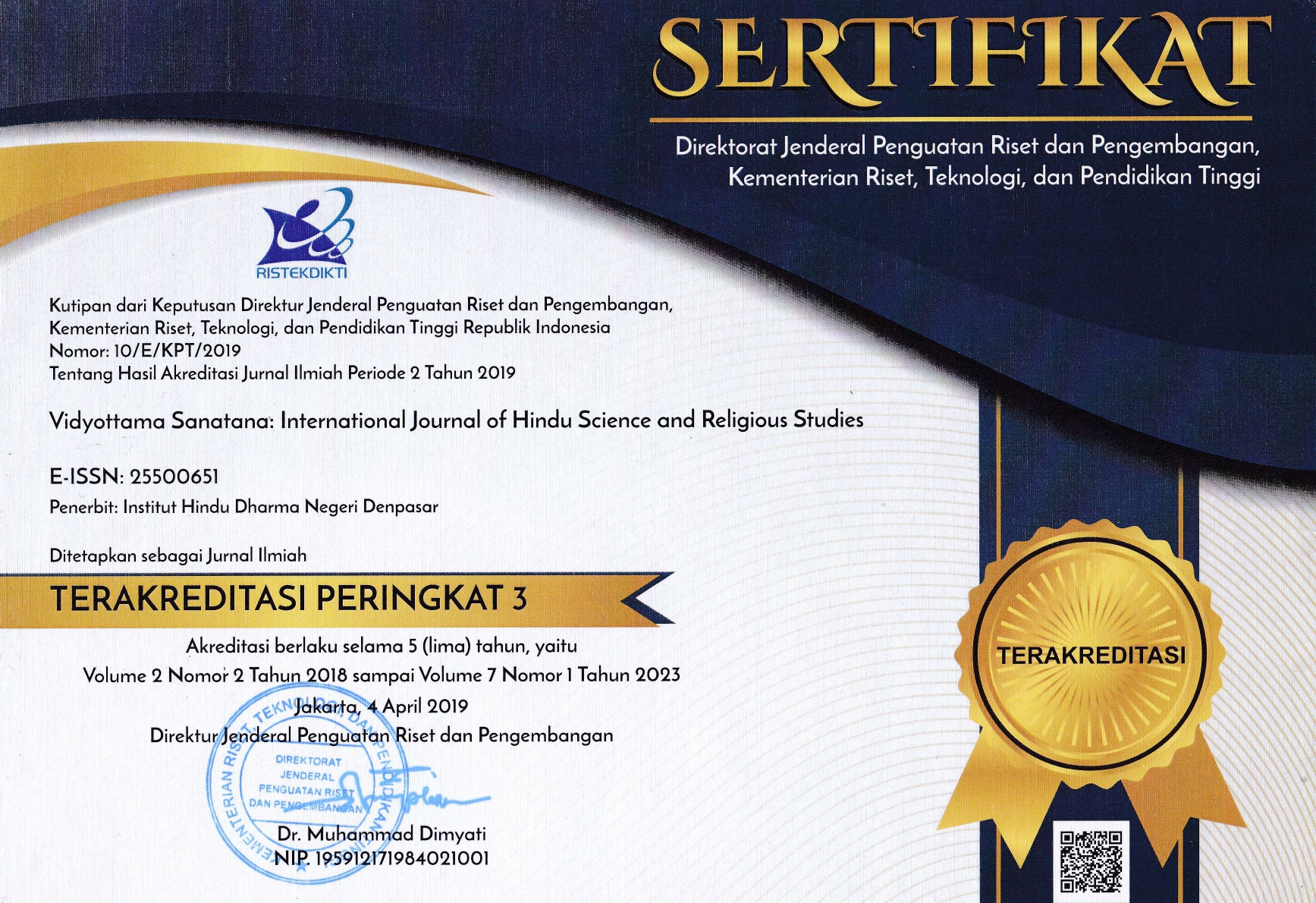CONTRADICTIONS OF THE COMMUNITIES OF UNDISAN TEMBUKU BANGLI IN RESPONDING TO THE ORGANIZATION OF NGABEN IN CREMATORIUM
DOI:
https://doi.org/10.25078/vidyottama.v6i1.815Keywords:
Contradiction, Ngaben Ceremony, CrematoriumAbstract
The purpose of this study is to examine the pros and cons of holding the Ngaben ceremony at the crematorium for the people of Undisan Village, Tembuku, Bangli, Bali, and to examine the implications of the ceremony. Ngaben at the crematorium for the people of Undisan Village, Tembuku, Bangli, Bali. The data were analyzed using several theories, namely McDonaldization theory, Symbolic Interactionism Theory and Social Change Theory. This study uses a qualitative approach. The research location is Undisan Tembuku Village, Bangli, Bali. Data collection techniques were carried out through observation, interviews, and document studies. Data validity was obtained by using triangulation technique. Informants were determined purposively, and the researcher himself as the main instrument was assisted by interview guides, cameras and stationery. From the results of the study, the pros and cons of the community in the Ngaben ceremony at the crematorium are as follows. People who are pro of the equality of the Ngaben ceremony at the crematorium, the equality of sradha and devotional service, the basic equality of beliefs, changes in tradition, considerations for choosing the place for the Ngaben ceremony at the crematorium, considerations of cost efficiency, limited time, energy, and solidarity, work in the non-agricultural sector (heterogeneous), educated community groups, loosening customary sanctions in responding to social change. As for the people who are against the preservation of traditions, strengthening solidarity, employment in the agricultural sector (homogeneous), community groups with limited education, strict customary sanctions in responding to social change.
References
Abdullah, Irwan. 2006. Konstruksi dan Reproduksi Kebudayaan. Yogyakarta: Pustaka Pelajar.
Kajeng, I Nyoman. dkk. 1997. Sarasamuscaya dengan Teks Bahasa Sansekerta dan Jawa Kuno. Surabaya: Penerbit Paramita
Gunawan, Imam. 2013. Metode Penelitian Kualitatif. Teori dan Praktik. Jakarta: PT Bumi Aksara.
Parimartha, I Gede. 2013. Silang Pandang Desa Adat dan Desa Dinas di Bali. Denpasar: Udayana University Press.
Pilliang, Yasrat Amir. 2004. Posrealitas: Realitas Kebudayaan dalam Era Posmetafisika. Yogyakarta : Jalasutra.
Ritzer, G. 2013. McDonaldisasi Masyarakat (Terjemahan: Fajria, A. 2014). Yogyakarta: Pustaka Pelajar.
Soerjono, Soekanto. 2003. Sosiologi Suatu Pengantar. Jakarta: PT. Raja Grafindo Persada.
Sudharta, Tjok, Rai dan Ida Bagus Punyatmaja. 2001. Upadesa. Surabaya: Paramita.
Sudarma, I Putu. 2000. Penggunaan Uang Kepeng dalam Upacara Ngaben di Desa Adat Suralaga. Desa Abiantuwung, Kecamatan Kediri, Kabupaten Tabanan. Tesis. Yogyakarta: Program Pascasarjana Universitas Gajahmada.
Surpha, I Wayan. 2002. “Eksistensi Desa Adat dan Desa Dinas di Bali”. Denpasar: Pustaka Bali Post.
Sudarma, I Putu. 2000. Penggunaan Uang Kepeng dalam Upacara Ngaben di Desa Adat Suralaga. Desa Abiantuwung, Kecamatan Kediri, Kabupaten Tabanan. Tesis. Yogyakarta: Program Pascasarjana Universitas Gajahmada.
Surpha, I Wayan. 2002. “Eksistensi Desa Adat dan Desa Dinas di Bali”. Denpasar: Pustaka Bali Post.
Undang-Undang Nomor 20, Tahun 2003 tentang Sistem Pendidikan Nasional, Jakarta: Ekajaya.
Wahyudi. 2009. Budaya Sekolah Unggul. Jurnal Cakrawala Pendidikan.
Bandung : Alfabeta, CV.
Sutrisno, Nanang. 2015. Transformasi Kultural Dalam Keberagamaan Umat Hindu di Kabupaten Banyuwang. Denpasar: UNHI


















